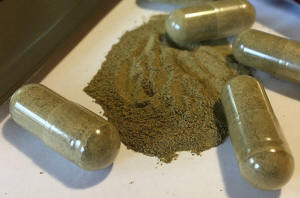US health officials crack down on kratom-related products after
complaints from supplement industry
[July 30, 2025]
By MATTHEW PERRONE
WASHINGTON (AP) — U.S. health officials are warning Americans about the
risks of an opioid-related ingredient increasingly added to energy
drinks, gummies and supplements sold at gas stations and convenience
stores, recommending a nationwide ban.
The chemical, known as 7- hydroxymitragynine, is a component of kratom,
a plant native to Southeast Asia that has gained popularity in the U.S.
as an unapproved treatment for pain, anxiety and drug dependence.
In recent months, dietary supplement companies that sell kratom have
been urging the Food and Drug Administration to crack down on the
products containing 7-OH, portraying it as a dangerously concentrated,
synthetic form of the original ingredient.
The FDA action “is not focused on natural kratom leaf products,"
according to a statement Tuesday by the U.S. Department of Health and
Human Services.
The agency said it was releasing a report to educate about the risks of
“7-OH and its distinction from the kratom plant leaf.” Regulators are
also recommending that the ingredient be placed on the federal
government's most restrictive list of illegal drugs, which includes LSD
and heroin.
“7-OH is an opioid that can be more potent than morphine," said FDA
Commissioner Marty Makary. "We need regulation and public education to
prevent another wave of the opioid epidemic.”

The agency’s recommendation will be reviewed by the Drug Enforcement
Administration, which sets federal rules for high-risk drugs including
prescription medicines and illicit substances. A national ban wouldn’t
take effect until the agency drafts and finalizes new rules governing
the ingredient.
Federal regulators have been scrutinizing kratom for about a decade
after reports of addiction, injury and overdose. But users and
distributors have long opposed efforts to regulate it, saying kratom
could be a safer alternative to opioid painkillers that sparked the
ongoing drug addiction epidemic.
Last month, the FDA issued warning letters to seven companies selling
drinks, gummies and powders infused with 7-OH. Regulators said the
products violated FDA rules because they have not been evaluated for
safety and, in some cases, claimed to treat medical conditions,
including pain, arthritis and anxiety.
Supplement executives quickly applauded the move.
[to top of second column]
|

This Sept. 27, 2017 file photo shows kratom capsules in Albany, N.Y.
(AP Photo/Mary Esch, File)
 The FDA "demonstrated the exact kind
of data-driven, proactive regulatory excellence needed to safeguard
unwitting consumers across the U.S.,” said Ryan Niddel of
Diversified Botanics, a Utah-based company that sells kratom
supplements.
An industry group, the American Kratom Association, has lobbied
Congress for years against restrictions on the plant. Legislation
supported by the group would prohibit the FDA from regulating kratom
more strictly than food and dietary supplements.
On Tuesday, a rival group that supports the availability of 7-OH
drugs criticized the government's move, pointing to the influence of
kratom suppliers.
“Big kratom trade groups have spent years blaming 7-OH for harms
caused by their own unregulated products, because it threatens their
market share,” the Holistic Alternative Recovery Trust stated in an
emailed message.
Nearly a decade ago, the federal government came close to banning
kratom.
In 2016, the DEA announced plans to add it to the government’s most
restrictive schedule 1, reserved for drugs that have no medical use
and a high potential for abuse. But the plan stalled after a flood
of public complaints, including a letter signed by more than 60
members of Congress.
The FDA then began studying the ingredient, concluding in 2018 that
kratom contains many of the same chemicals as opioids, the addictive
class of drugs that includes painkillers like OxyContin as well as
heroin and fentanyl.
Since then, FDA regulators have continued to issue warnings about
cases of injury, addiction and death with kratom supplements, which
are usually sold in capsules or powders.
In recent months, the FDA has also issued warnings on other
unapproved drugs sold as supplements or energy drinks, including the
antidepressant tianeptine. Sometimes referred to collectively as
“gas station heroin,” the drugs have been restricted by several
states, but they are not scheduled at the federal level.
All contents © copyright 2025 Associated Press. All rights reserved |